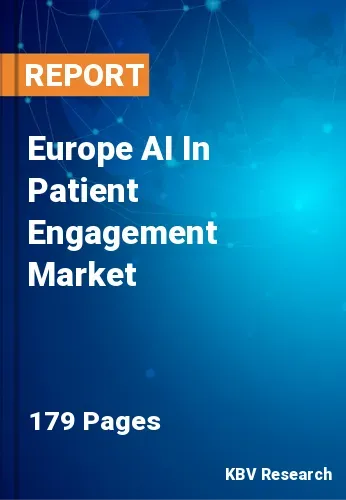The Europe AI In Patient Engagement Market would witness market growth of 22.8% CAGR during the forecast period (2023-2030).
To maximize therapeutic compliance and health outcomes, businesses in the life sciences sector are concentrating on improving patient engagement with their platforms, people, processes, and organizations. This goal is still unwavering, but new elements like patient marketing, patient data security, and organizational impacts push patient engagement tactics to change. Companies understand how the humanistic and informed approach will serve consumers and their families throughout diagnosis, therapy, and wellness as they strive to provide patient marketing and assistance services in an effortless and informed manner.
With AI enabling robotics and operational efficiency, healthcare providers find it an appealing solution because of technological improvements and the growing need to contain rising healthcare costs. Enhanced communication and engagement have been prioritized in the change to patient-centered care, consistent with AI's ability to close the provider-patient divide. The pandemic has expedited the continuing digitization in healthcare, which highlights the significance of AI in improving the quality of virtual treatment and patient experiences. Furthermore, the use of AI is fueled by its potential for predictive analytics, tailored therapy, and patient empowerment. Support from regulators, easier access to data, and the need for a competitive advantage all contribute to integrating AI with significant R&D spending.
The demand of the market in Europe is expected to increase significantly because of factors including the high incidence of chronic illnesses in the region, sophisticated healthcare facilities, and expanding government initiatives to integrate AI into healthcare. The past few years have seen a boom in healthcare spending throughout the European Union, attributed to several factors, such as an ageing population, an increase in chronic illnesses' prevalence, and the need for excellent medical care.
The Germany region dominated the Europe AI In Patient Engagement Market by Country in 2022, and would continue to be a dominant market till 2030; thereby, achieving a market value of $1,320.1 million by 2030. The UK region is exhibiting a CAGR of 21.7% during (2023 - 2030). Additionally, The France region would experience a CAGR of 23.7% during (2023 - 2030).
Based on Delivery Type, the market is segmented into Cloud-based and On-premises. Based on Technology, the market is segmented into Chatbots, NLP (Natural Language Processing) and Computer Vision. Based on Application, the market is segmented into Outpatient Health Management, In-patient Health Management, Population Health Management, and Others. Based on Therapeutic Area, the market is segmented into Health & Wellness, Chronic Disease Management, and Others. Based on End-use, the market is segmented into Providers, Payers, and Others. Based on Functionality, the market is segmented into Communication, Administrative, Patient Education, Billing & Payments, Health Tracking & Insights and Others. Based on countries, the market is segmented into Germany, UK, France, Russia, Spain, Italy, and Rest of Europe.
Free Valuable Insights: The Global AI In Patient Engagement Market will Hit $22.4 Billion by 2030, at a CAGR of 22.3%
The market research report covers the analysis of key stake holders of the market. Key companies profiled in the report include Cerner Corporation, Nuance Communications, Inc., Health Catalyst, Inc., F. Hoffmann-La Roche Ltd., Ada Health GmbH, Lark Technologies, Inc., Upfront Healthcare Services, Infermedica Sp. z o.o., Aiva, Inc. and American Well Corporation (Amwell).
By Delivery Type
By Technology
By Application
By Therapeutic Area
By End-use
By Functionality
By Country

Our team of dedicated experts can provide you with attractive expansion opportunities for your business.

